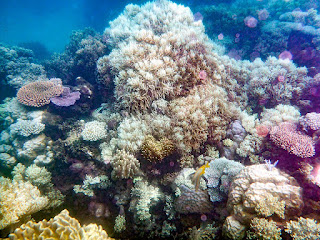A Lesson? Good News? Why Not Both?
Thursday, August 18, 2022
At Spiked!, Brendan O'Neill considers the recent finding that Australia's Great Barrier Reef is the healthiest that it has ever been since measurements began decades ago.
His title -- "Why Eco-Alarmists Are Wrong About Almost Everything" -- isn't quite right, but that does not make this piece any less worthwhile.
The whole thing merits a read, and is short enough to keep in mind as something you could point out to a persuadable person. Two excerpts should make that case.
First, O'Neill reminds us of the fact that our wonderment and affection for the reef have been used against us as a cudgel for quite a long time:
Second, O'Neill reminds us -- as have the likes of Alex Epstein, Michael Shellenberger, and Bjorn Lomborg -- of the importance of our great mastery (his term) over nature:We should remind ourselves just how important reports of the reef's death were to the climate-change narrative. There were endless fear-stirring headlines about the lethal threat posed by industrious mankind to Earth's largest coral reef system. Images of the sick white coral were used to boost the eco-sermonising of the elites, to add weight to their narrative about the human impact on the natural world being a wicked and murderous thing. Greenpeace even held an underwater protest in the reef, with a banner saying 'Coal is killing the reef'. Really? Coal production in Queensland has steadily risen -- Queensland produces millions of tonnes of coal every year -- and yet the reef's health has improved. Fake news, Greenpeace? [link omitted, bold added]
Image by Gökhan Tolun, via Wikimedia Commons, license.
Eco-alarmists aren't only wrong about the death of Earth -- they're wrong about life on Earth right now. The message they constantly send is that everything is dire. The big, disgusting 'human footprint' on poor Mother Earth is causing heatwaves and storms and death on an unprecedented scale, they say. It is all so overblown. We are actually safer from nature's violent whims than we have ever been. The number of people dying in natural calamities fell from around 500,000 a year in the 1920s to 14,000 in 2020. That's a 96 per cent drop. The percentage of human beings living in poverty fell from more than 80 per cent at the start of the 19th century to less than 20 per cent in the 2010s. Deaths from disease and war have also declined dramatically in the modern era. Child labour, too. Life expectancy, meanwhile, has shot up. In Europe, it went from 34 years to 79 years between 1770 and 2019. That is, at the exact time that mankind was having industrial revolutions and allegedly being a plague on the planet, the health and prospects of humanity improved in a way our ancestors could only have dreamed of. It's almost as if modernity is good for us.I have heard others say words to the effect that if someone thinks there is a "climate crisis" caused by carbon dioxide emissions, but opposes nuclear power, that person shouldn't be taken seriously. I agree.
We must never let the anti-industrial rage of the elites blind us to how brilliant our impact on the planet has been. We haven't destroyed Earth -- we have tamed it and civilised it; we have unlocked its secrets; we have transformed this wild and unpredictable ball in space into a planet that can happily host eight billion people, and more besides. Occasionally bleached coral is a very small price to pay for the liberation of humanity from death and drudgery, wouldn't you say? [links omitted, bold added]
Perhaps another quick way to gauge whether someone is serious or thoughtful about this issue is how they react to good news like this. Are they at least relieved? Do they do what O'Neill does and reconsider the numerous doomsday predictions that it calls into question?
If a mother fears for her child's life and gets a good (and solid) prognosis, would she not react with delight and relief? And what would it mean if she ignored the news or insisted on continuing treating her child as if he had six months left to live? I don't know, either, but it is akin to the silence and indifference greeting this good news from climate catastrophists.
This is good news, and in the greater context that O'Neill provides, it means lots of us can and should stop worrying and get on with our lives.
-- CAV


2 comments:
Yo, Gus, a similar example is the recent newspaper article I ran across when it was passed around by a couple of FB friends that plankton had declined 90% recently, threatening to kill off ocean life. Well, no. This covers it pretty well, with a good bit of background-filling I enjoyed reading. But what bemused me most when I read it is that the claim was made in 2010 and there's been serious debate over it since then; it's definitely unlikely to be anywhere near true, judging from the balance of evidence. Will it simply enter the history of scientific debate, though, or will it continue being injected into the newspapers to bedevil public discourse? I know where I'd place my bet.
Thanks!
The last couple of paragraphs of that second linked piece are hilarious in a way: "The media are a very poor source of information on science."
Understatement of the century, that.
Post a Comment